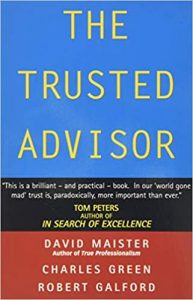Hören (hear), Zuhören (listen) , aktives Zuhören, Paraphrasieren – es gibt immer wieder den Hinweis, warum richtiges Zuhören die absolut wichtigste Fähigkeit ist, die ein Berater, Coach, Mediator, Therapeut, Chef, Mitarbeiter, Lebenspartner, Vater, Sohn* haben muss.
Oder gehören Sie zu den Menschen, die genau dann sagen, das war aber ein tolles Gespräch mit Ihnen, wenn Sie selber einen Redeanteil von 90% und mehr hatten.
 Eine sehr gute Übersicht für die Fähigkeiten guter Zuhörer und Schwächen schlechter Zuhörer bietet David H. Maister in seinem Buch The Trusted Advisor in Kapitel 11, ab S.97.
Eine sehr gute Übersicht für die Fähigkeiten guter Zuhörer und Schwächen schlechter Zuhörer bietet David H. Maister in seinem Buch The Trusted Advisor in Kapitel 11, ab S.97.
Hier die Zusammenfassung S.211f., der Einfachheit halber in Englisch
„What Good Listeners Do
- Probe for Clarification
- Listen for unvoiced emotions
- Listen for the story
- Summarize well
- Empathize
- Listen for what´s different, not for what´s familiar
- Take it all seriously (they don´t say, „You shouldn´t worry about that“)
- Spot hidden assumptions
- Let the client „get it out of his or her system“
- Ask „How do you feel about that“
- Keep the client talking („What else have you considered“)
- Keep asking for more detail that helps THEM understand
- Get rid of distractions while listening
- Focus on hearing your version first
- Let you tell your story your way
- Stand in your shoes, at least while they´re listening
- Ask you how you think they might be of help
- Ask what you´ve thought of before telling you what they’ve thought of
- Look at (not stare at) the client as he or she speaks
- Look for Congruity (or incongruity) between what the client says and how he or she gestures and postures
- Make it seem as if the client is the only thing that matters and that they have all the time in the world
- Encourage by nodding head or giving a slight smile
- Are aware of and control their body movement (no moving around, shaking legs, fiddling with a paper clip)
What Great Listeners Don´t Do
- Interrupt
- Respond too soon
- Match the client´s points („Oh, yes, I had something like that happen to me. It all started…“)
- Editorialize in midstream („Well, that option´s a nonstarter“)
- Jump to conclusions (much less judgments)
- Ask closed-end questions for no reason
- Give you their ideas before hearing yours
- Judge you
- Try to solve the problem too quickly
- Take calls or interruptions in the course of a client meeting
*Natürlich sind alle genannten Begriffe auch in der weiblichen Form genauso gültig.
